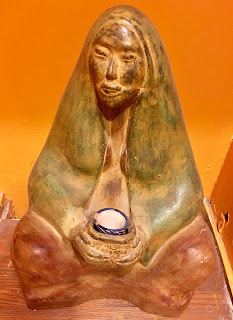A Revised Common Lectionary resource for April 1
Published on 3/27/2018 by Presbyterians Today magazine blog: One Church, Many Voices
by Magdalena I. García
Read the full lectionary passage here
The stone falls
from the hand of an accuser
and refuses to put to death
a woman caught in adultery,
because she deserves instead
the gift of a new life.
The stone shouts
on the trail to Jerusalem
and refuses to keep silent
unlike the Pharisees,
because it must proclaim instead
the gift of new life.
The stone rolls
from the door of a tomb
and refuses to impose burial
on a man wrapped in linen,
because he has received instead
the gift of new life.
All the stones come alive
and join in the telling of your story,
Master Jesus, Living Christ,
except the hardened rock
of our sealed lips,
our paralyzed feet,
and our petrified hearts.
Break us open,
God of the water-bursting rock,
take away all prejudice and fear,
free us from anything that hinders
the gift of new life.
Break us open,
God of the empty tomb,
grant to us compassion and courage,
make us eager to proclaim
the gift of new life.
%%%
Un recurso para la liturgia dominical del 1 de abril
Publicado el 3/27/2018 por el blog de la revista Presbyterians Today: One Church, Many Voices
por Magdalena I. García
Lea el pasaje completo aquí
La piedra cae
de la mano del acusador
y rehúsa dar muerte
a una mujer sorprendida en adulterio,
porque ella merece a cambio
el don de la nueva vida.
La piedra grita
camino de Jerusalén
y rehúsa guardar silencio
a diferencia de los fariseos,
porque debe proclamar a cambio
el don de la nueva vida.
La piedra rueda
de la puerta de una tumba
y rehúsa imponer el entierro
a un hombre envuelto en lino,
porque él ha recibido a cambio
el don de la nueva vida.
Todas las piedras cobran vida
y se unen al recuento de tu historia,
Maestro Jesús, Cristo Vivo,
excepto la roca endurecida
de nuestros labios sellados,
nuestros pies paralizados
y nuestros corazones petrificados.
Quebrántanos,
Dios de la roca de la cual brota agua,
quítanos todo prejuicio y temor,
líbranos de todo lo que impida
el don de la nueva vida.
Quebrántanos,
Dios de la tumba vacía,
concédenos compasión y valor,
danos ansias de proclamar
el don de la nueva vida.
© Magdalena I. García
Published on 3/27/2018 by Presbyterians Today magazine blog: One Church, Many Voices
by Magdalena I. García
A stone along the path at Montrose Cemetery, in Chicago. / Una piedra junto al
camino en el cementerio Montrose, en Chicago.
They had been saying to one another, ‘Who will roll away the stone for us from the entrance to the tomb?’ – Mark 16:3
Read the full lectionary passage here
The stone falls
from the hand of an accuser
and refuses to put to death
a woman caught in adultery,
because she deserves instead
the gift of a new life.
The stone shouts
on the trail to Jerusalem
and refuses to keep silent
unlike the Pharisees,
because it must proclaim instead
the gift of new life.
The stone rolls
from the door of a tomb
and refuses to impose burial
on a man wrapped in linen,
because he has received instead
the gift of new life.
All the stones come alive
and join in the telling of your story,
Master Jesus, Living Christ,
except the hardened rock
of our sealed lips,
our paralyzed feet,
and our petrified hearts.
Break us open,
God of the water-bursting rock,
take away all prejudice and fear,
free us from anything that hinders
the gift of new life.
Break us open,
God of the empty tomb,
grant to us compassion and courage,
make us eager to proclaim
the gift of new life.
%%%
“La piedra”
Un recurso para la liturgia dominical del 1 de abril
Publicado el 3/27/2018 por el blog de la revista Presbyterians Today: One Church, Many Voices
por Magdalena I. García
Y unas a otras se decían: ‘¿Quién nos quitará la piedra para entrar al sepulcro?’ – Marcos 16:3
Lea el pasaje completo aquí
La piedra cae
de la mano del acusador
y rehúsa dar muerte
a una mujer sorprendida en adulterio,
porque ella merece a cambio
el don de la nueva vida.
La piedra grita
camino de Jerusalén
y rehúsa guardar silencio
a diferencia de los fariseos,
porque debe proclamar a cambio
el don de la nueva vida.
La piedra rueda
de la puerta de una tumba
y rehúsa imponer el entierro
a un hombre envuelto en lino,
porque él ha recibido a cambio
el don de la nueva vida.
Todas las piedras cobran vida
y se unen al recuento de tu historia,
Maestro Jesús, Cristo Vivo,
excepto la roca endurecida
de nuestros labios sellados,
nuestros pies paralizados
y nuestros corazones petrificados.
Quebrántanos,
Dios de la roca de la cual brota agua,
quítanos todo prejuicio y temor,
líbranos de todo lo que impida
el don de la nueva vida.
Quebrántanos,
Dios de la tumba vacía,
concédenos compasión y valor,
danos ansias de proclamar
el don de la nueva vida.
© Magdalena I. García





